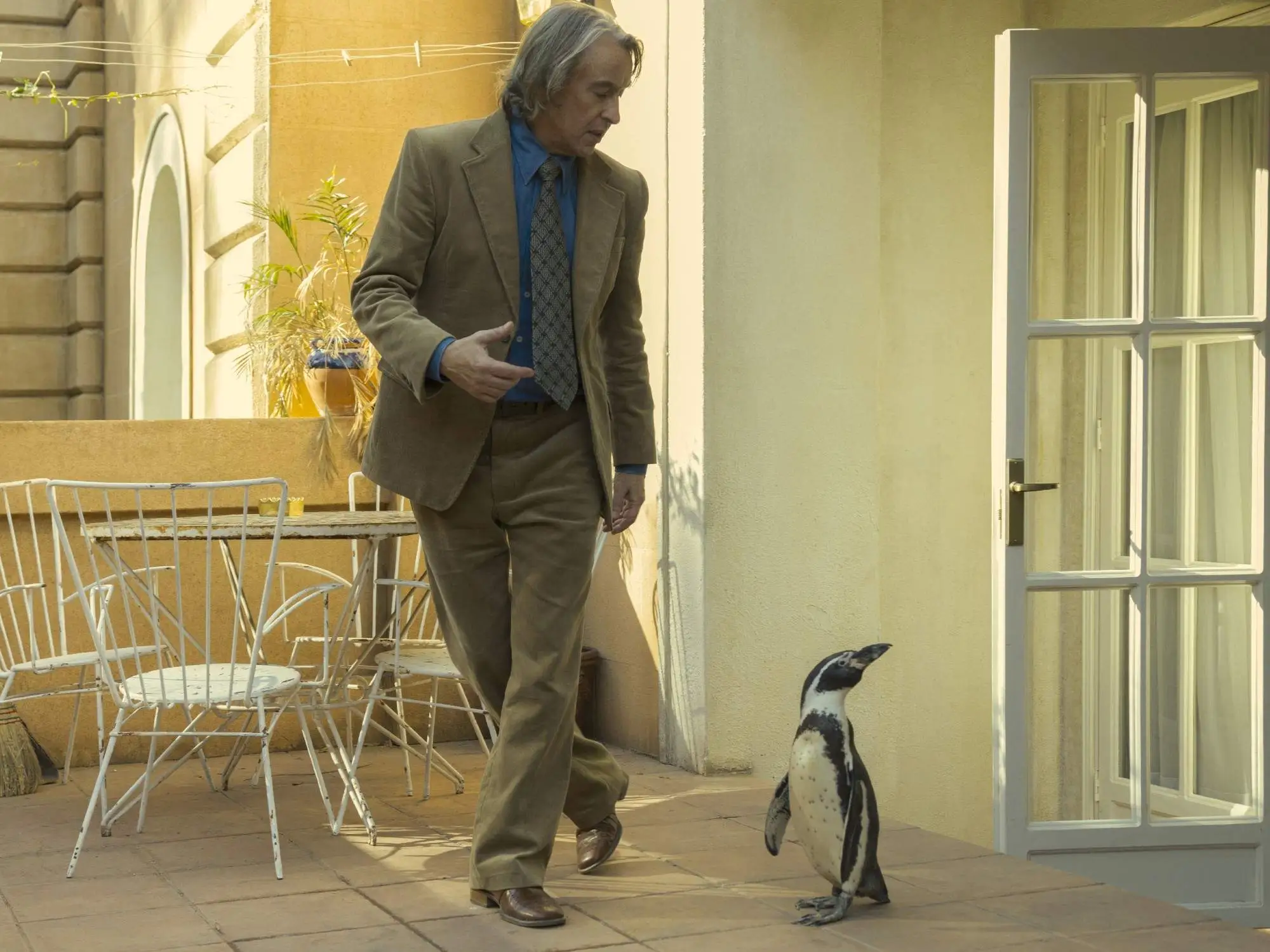The Penguin Lessons
An "anti-fascism" historical film whose idea of resisting demagogues is limited to letter writing and asking the paramilitary enforcer agents to kindly return the civilians they kidnap.

Thank you to patron Tonia Herron for supporting the site! All previous paid subscribers (prior to May 2025) and all Pantheon tier subscribers moving forward will be eligible to pick films for review. Read the details of this availability here and stay tuned for an email when it's your turn to choose.
When Dua Lipa asked Stephen Colbert about how his faith and comedy overlap, The Late Show host quoted great poet Robert Hayden, “We must not be frightened nor cajoled into accepting evil as deliverance from evil. We must go on struggling to be human, though monsters of abstraction police and threaten us.” Colbert, like the best of comedians, knows that there is a place for comedy alongside, and even because of, the evils of our world. Many great comedies have reacted brilliantly to contexts of tyrannical politics and human rights abuses. Charlie Chaplin plays both the Führer stand-in Adenoid Hynkel in The Great Dictator as well as the iconic role of the Jewish barber. The Korean satire of President Park Chung-hee’s assassination, The President’s Last Bang, uses the authoritarian leader’s death to reveal the absurd restrictions on liberty of the dictatorship. It’s a slippery game to play, though. One misstep in any number of directions could end up with a historical comedy too glib and too schmaltzy to rouse. The Penguin Lessons, an adaptation of Tom Michell’s memoir of the same name, is one of the tasteless and glib attempts to balance comedy and the “monsters of abstraction.”
It’s not even a straight comedy, but its absurd (and true) premise of a teacher that learns about life from a penguin is so ineffably silly and happy-go-lucky that it’s impossible to isolate the dramatic elements from the comedic ones. The film from director Peter Cattaneo (The Full Monty) fails to do what these much better films do in similar contexts. It has no teeth, an "anti-fascism" historical film whose idea of resisting demagogues is limited to letter writing and asking the paramilitary enforcer agents to kindly return the civilians they kidnap.
Set after the 1976 coup and during the Dirty War, The Penguin Lessons follows jaded expatriate English teacher Tom Michell (Steve Coogan) to Argentina where he shows no inspiration to invest in the children at St. George’s College, a rich and preppy all-boys boarding school. The character in the memoir is much younger than Coogan, whose gray hair makes Tom’s disinterest come off as cynical rather than heartless. Tom leaves the country the week of the coup until things cool down and rescues a penguin trapped in oil on the beach in Uruguay. (Yes, they have penguins there.) The authorities on both sides of the border inexplicably and hilariously force Tom to take the bird home with him against his every wish and he slowly learns to be pedagogically and morally engaged through the bird.
The Penguin Lessons tries its best to be a cross between Dead Poets Society and Paddington, and it’s much better at the former than the latter. Coogan gives one of his better dramatic performances while still bringing his experienced comedic timing to the role. Most of the comedy centers around the strangeness of Tom’s relationship to the bird that poops in his house, follows him like a lost dog, and serves as an unconsensual and non-verbal therapist to a variety of St. George faculty members, including Headmaster Buckle (Jonathan Pryce) and Finnish physics teacher Tapio (Björn Gustafsson). Most of the jokes are funny the first time, sedate the second time, and unbearable the third time.
Another major change from the memoir to the adaptation is the politics. “The politics felt like they were sort of underserved in the book, and it felt very difficult to do a film set in Argentina in 1976 without building that out more. Like, we either needed to change the time period, or we had to deal with it,” Coogan told the National Board of Review. The politics under question would be Argentina’s Dirty War, which ended in the deaths and "disappearances" of more than 30,000. That the real Michell touched on such events so minimally in the source text should have been the first sign of an irreparable disconnect between the penguin student-teacher comedy and the historical context.
One of the school’s maids, Sofía Alvarez (Alfonsina Carrocio), hates fascists, supports the opposition, and even keeps company with a fishmonger who tries to prompt her to pick up arms with the Montoneros. The inclusion of the fishmonger seems to be simply to separate the kind of anti-fascist Sofía is — a pacifist who believes violence can never be a solution — from the arms-holding Montoneros. The Penguin Lessons plays the non-committal and peddling bothsidesism game with tyrannical governments and advocates for liberation. The more radical fishmonger becomes another ornament of hatred as far as Cattaneo is concerned. The chosen victim of fascism, Sofía, is more palatable to liberal sensitivities. The fish seller who wants to take up arms against the fascists is too extreme for our sympathy, so he disappears from the plot as soon as he is used to clarify the difference between the two. That’s a problem because one can't fight fascism with a cute penguin. The Allies didn’t just ask Hitler to kindly stop rounding Jews into concentration camps; they crumbled his military and were going to put a bullet through his skull.